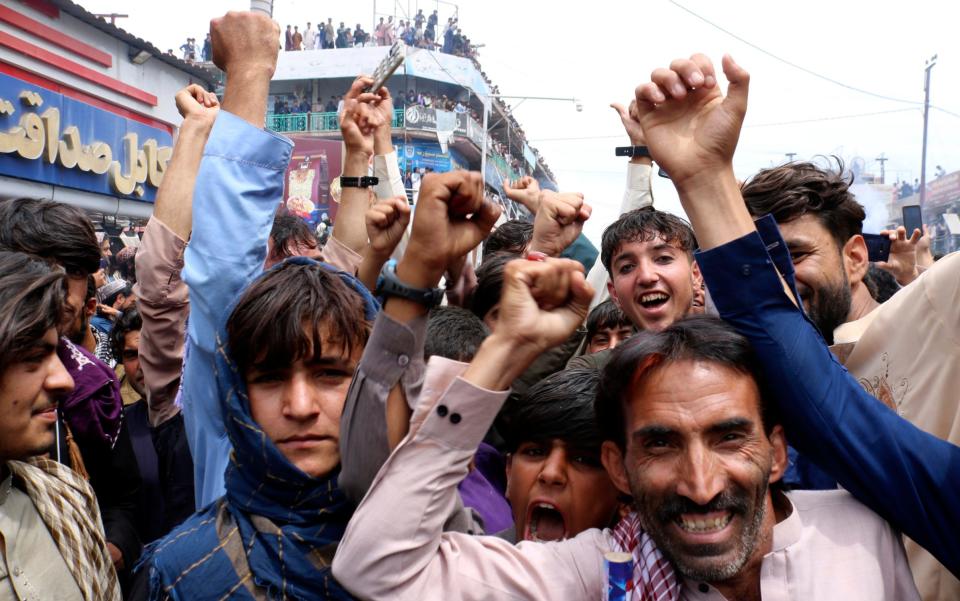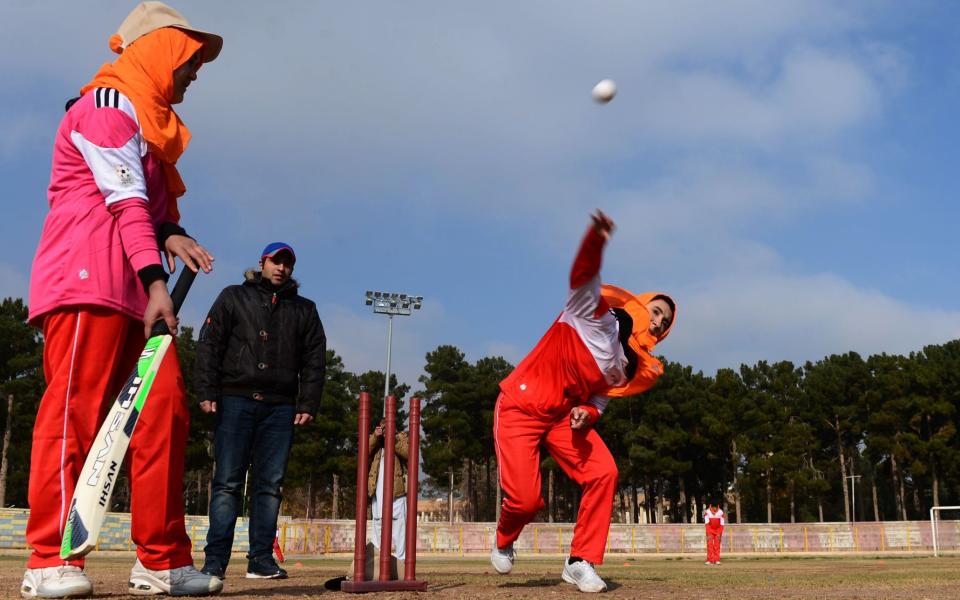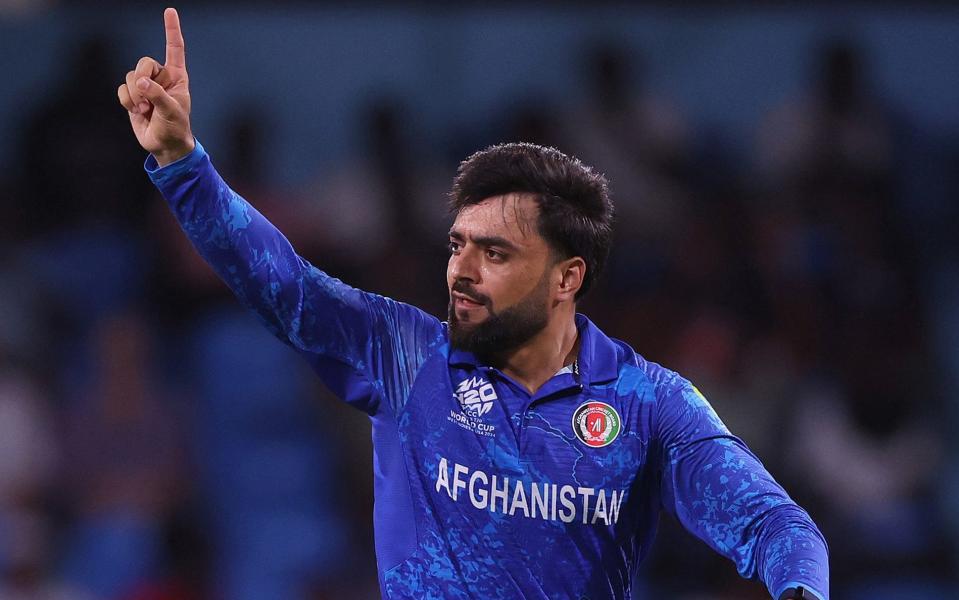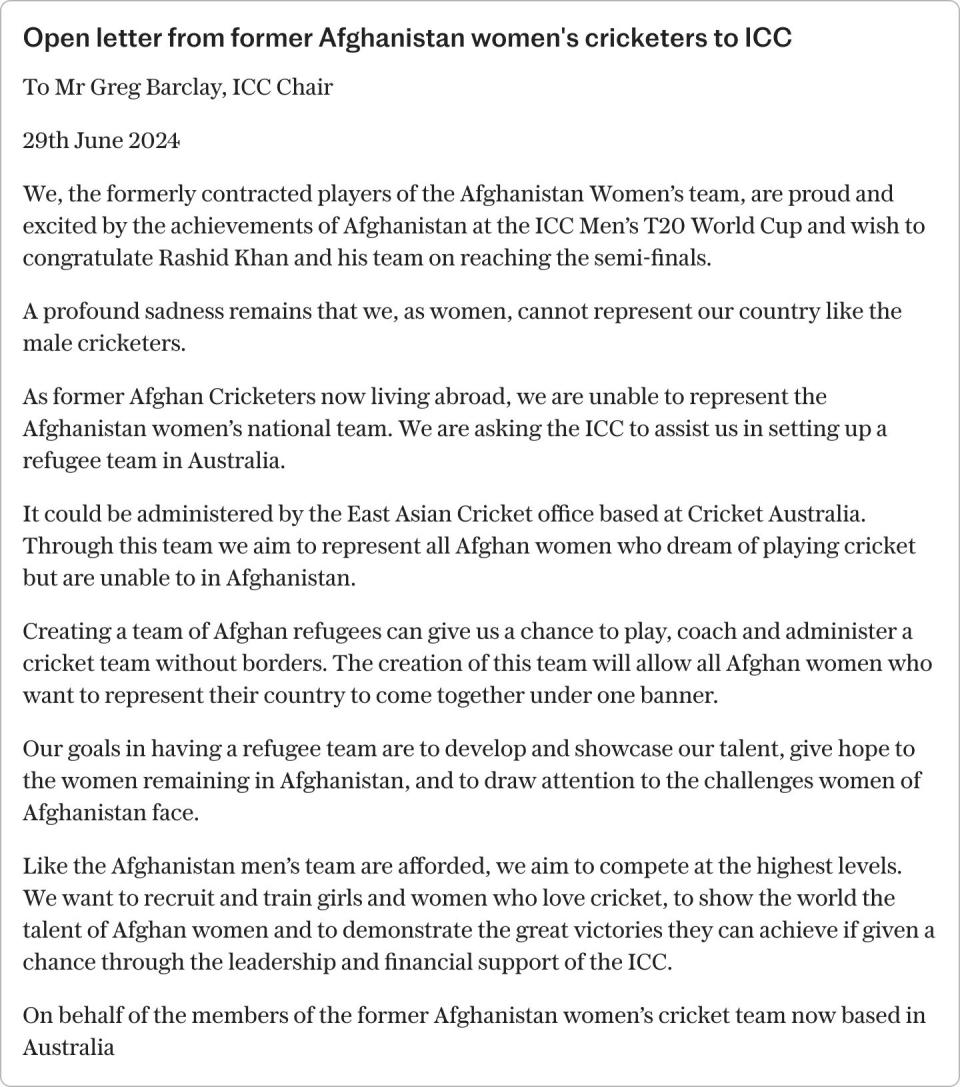
The most significant story of the Twenty20 World Cup was not India’s first World Cup victory for 13 years. Instead, it was Afghanistan reaching their first World Cup semi-final. Inadvertently, they also highlighted how half the nation’s population are denied the same opportunities.
It is a point that Afghanistan’s women cricketers, who fled the country after the Taliban regained power three years ago, have swiftly made.
“A profound sadness remains that we, as women, cannot represent our country like the male cricketers,” members of the former Afghanistan women’s side, who are now largely based in Australia, wrote in an open letter to the International Cricket Council. “As former Afghan Cricketers now living abroad, we are unable to represent the Afghanistan women’s national team. We are asking the ICC to assist us in setting up a refugee team in Australia.
“Our goals in having a refugee team are to develop and showcase our talent, give hope to the women remaining in Afghanistan, and to draw attention to the challenges women of Afghanistan face.”
“Like the Afghanistan men’s team are afforded, we aim to compete at the highest levels. We want to recruit and train girls and women who love cricket, to show the world the talent of Afghan women and to demonstrate the great victories they can achieve if given a chance through the leadership and financial support of the ICC.”

Afghanistan men only played their first official game 20 years ago. Never have they played an international match at home. There is no indication of the wait ending while the Taliban remain in power.
Yet perhaps the most remarkable aspect of Afghanistan’s qualification for the Twenty20 World Cup semi-finals was how unremarkable it was. Seen through a narrow cricket lens, their achievements in beating New Zealand, Australia and Bangladesh were merely a mild surprise. At the 50-over World Cup last year, Afghanistan defeated England and Pakistan emphatically.
T20 is an even better fit for Afghanistan’s talents. Seven members of the side who reached the semi-finals played in this year’s Indian Premier League; captain Rashid Khan is perhaps the most valuable T20 cricketer in the world.

It has often been tempting to paint Afghan cricket as defying the oppressive forces in the country. The truth has always been more complex.
Cricket was permitted by the first Taliban government, which was in power from 1996-2001. Rather than an English game, cricket was seen as a Pakistani one. During the Taliban’s 20 years out of power, from 2001-21, many in the militant movement were devoted followers of the team, with commanders listening to matches on radio.
Since regaining control, the Taliban have sought to help the national team thrive. Within days of regaining Kabul, Taliban officials met with the Afghanistan Cricket Board. Hamdullah Nomani, the Taliban’s minister of urban development, recently told The Washington Post that the government is discussing plans to construct a large new cricket stadium in the capital.
It amounts to sportswashing: an abhorrent regime attempting to use the team’s success for their own ends. Afghanistan’s stirring World Cup run was cheered on by street parties in the country. Of course, the faces in the crowds were all men.
Women not being permitted to join these scenes illustrates the appalling reality facing females in Afghanistan today. It is more than 1,000 days since Afghan girls and young women have been barred from secondary schools, notes Zuzanna Olszewska, an associate professor in social anthropology at the University of Oxford. The Taliban demanded that no Afghan women be allowed to participate in the United Nations meeting set up to discuss the international community’s approach to Afghanistan, which started on Sunday.
Test status waved through despite sexism
When Afghanistan gained Test status, in 2017, they did not meet International Cricket Council membership requirements on women’s cricket. Their bid was still voted through by existing full members. To the full member boards, including England, Afghanistan’s lack of any women’s team at the time was no obstacle to their ascension.
National contracts were introduced for 25 Afghan women’s players in early 2021. Before the women’s team had ever played a game, those contracted players fled, mostly to Australia, as the Taliban approached Kabul. As part of their attack on women’s rights, the Taliban swiftly reinstated a ban on women playing sports.
This is the dark undercurrent to sport’s fairy tale. Incredibly, the Afghanistan men’s team benefit financially from the lack of a women’s side.
Funding for Afghanistan is not reduced to take into account that the board does not support women’s cricket. The ICC does not dictate how full members should spend their money, unlike for associate nations. So when Afghanistan gained Test status the global governing body effectively lost power over how to push for the country to spend more on women’s cricket.
While Ireland, who gained Test status at the same time, spend about £3 million a year on women’s cricket, Afghanistan do not spend anything, leaving more left over for their men’s side. The ICC has previously said that it “will not penalise the [Afghanistan Cricket Board], or its players for abiding by the laws set by the government of their country”: essentially, that it wants to keep out of politics. Yet funding a board that does not support women’s cricket is itself a political act.
Head of the Afghan cricket was appointed by Taliban
In their open letter to the ICC, Afghan women’s players said that they were “proud and excited” by the success of the men’s side. They have not advocated for the team to banned because of the political situation, as happened to South Africa during apartheid.
“We want the same opportunity,” Tuba Sangar, who was the women’s cricket development manager for the Afghan Cricket Board and fled to Canada as the Taliban returned, told Telegraph Sport last year. “Cricket is the only thing that at least people talk about Afghanistan positively. But, as a woman, it’s a hard feeling for me – I wish we had the same opportunity.”
Currently, only a country’s board can select a cricket team: the Afghan Cricket Board. The head of the Afghan Cricket Board was appointed by the Taliban.
The Afghan women’s team are essentially advocating that ICC funding intended for the Afghanistan women’s programme – now non-existent – could be diverted to female cricketers who have fled. This team would not be recognised as an official Afghan national team, so they would not be allowed to enter World Cups. But the team would keep alive an idea: that cricket can still be used as a force for good for Afghan women.
Afghanistan remain both cricket’s best story and its worst – simultaneously a testament to the power of sport, and also a reminder of the limits of what sport can change. As the rise of the men’s team continues, it will bring more questions about whether, while their women’s team are denied the same right, they should be allowed to play at all. The alternative path offered by the women’s side should be embraced.

Article courtesy of
Source link